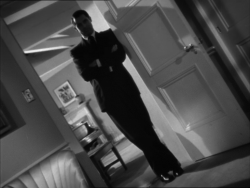by NEIL SINYARD

François Truffaut’s favourite of all Hitchcock’s films, Notorious is a spy story without violence but with uncommon emotional intensity. The daughter of a convicted Nazi (Ingrid Bergman) is recruited by an FBI agent (Cary Grant) to infiltrate a nest of Nazi sympathisers in post-war Rio, particularly through exploiting her attraction to their leader (Claude Rains). Hitchcock’s thriller technique is flawless, particularly at moments such as the famous crane shot that starts at the top of a balcony and ends on a stolen key concealed in Bergman’s hand, or a scene of high tension organised around a drugged cup of coffee. Yet the main suspense comes through the tormented relationships and from whether the central couple can break through their neurotic uncertainties about each other to a (literally) life-saving understanding. Scripted with superb economy by Ben Hecht, the film’s plot moves with implacable logic to the moment when a locked car door becomes a death sentence; and espionage becomes a metaphor for the kinds of betrayal and deceit that poison all communication, personal or political. As the ostensible villain, Claude Rains is, perversely, all aching sincerity, whereas the supposed hero, Cary Grant has a dark cynicism that chills the blood, the actor’s impeccable timing giving his wounding words an extra twist of the knife. No actress suffered more exquisitely for love on screen than Ingrid Bergman and this is her noblest, most courageous performance. Hitchcock might have been the Master of Suspense, but Notorious added another dimension to his creative personality: artist of erotic anguish.
